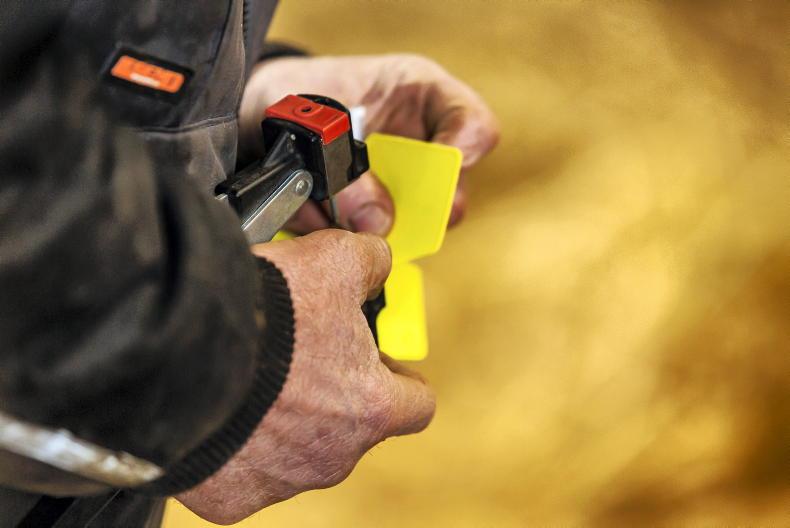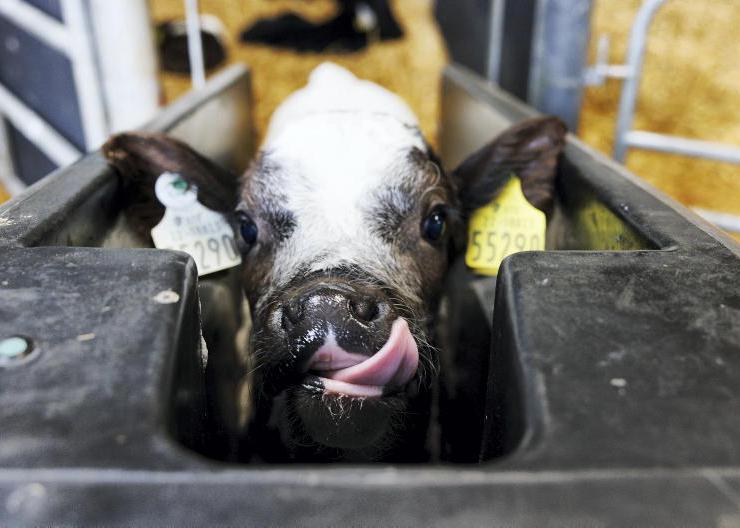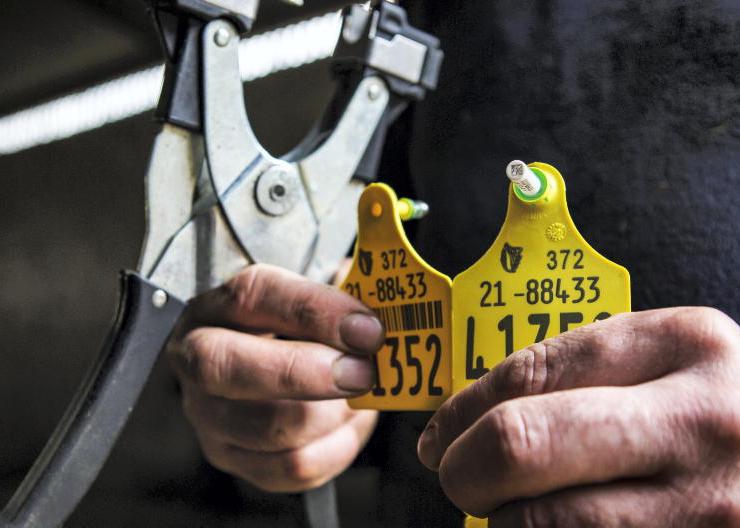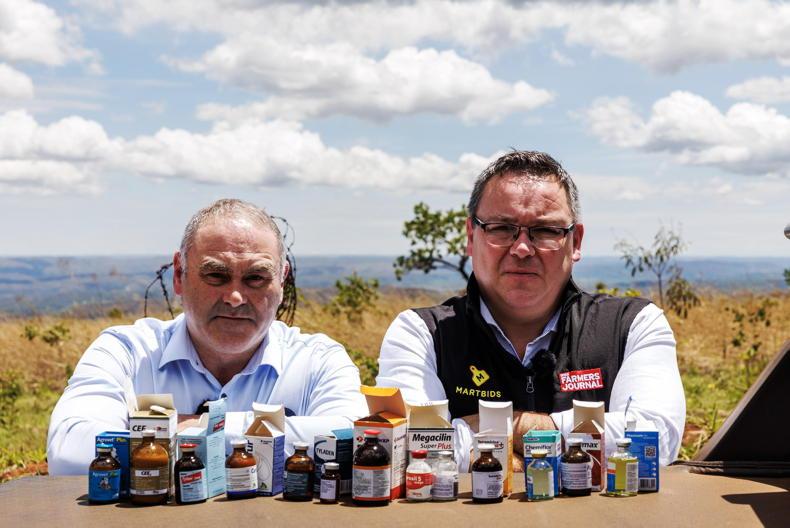Farmers will receive a maximum payment of €100 per herd to offset the additional costs of moving to mandatory bovine electronic identification from 1 July 2022. The first step in moving to the new identification system begins on 1 January 2022.
From this date, all new calf tag sets will possess an electronic tag, which will be white in colour. The corresponding tag will continue to be a tissue tag for collecting samples under the Bovine Viral Diarrhoea National Eradication Programme.
The cost of electronic identification tag sets compared to conventional tags currently range from €3.95 to €4.09 per EID tag set and cost from €1.05 to €1.11 more than the current tag set.
EID tagging will cost farmers over €2.2m per year once fully in place.
Funds allocated
The Minister announced on Friday that he is allocating a budget of €4.25m to the tag subvention scheme. The intention is that the scheme will operate over three years from 2022 to 2024.
Electronic tags ordered from 1 January will be eligible for funding with the first payment scheduled to take place in quarter four of 2022. It is predicted that €2.25m of this fund will be paid out in year one of the scheme.
The scheme is proportionately weighted in favour of smaller producers
The Department of Agriculture explained: “Payments in 2022 will be calculated on the number of new EID tag sets purchased from 1 January 2022 at a rate of €1 per new EID tag set. There is a maximum payment of €100 per farmer over the life of the scheme and no application process will be required.
“The scheme is proportionately weighted in favour of smaller producers. Farmers can only order annually the number of new tag sets required commensurate to the number of breeding females in the herd.”
Tag threshold
The limit on the number of tags which can be ordered in any one year is already in place under the tag threshold introduced on 22 July 2020 to comply with EU legislation.
The threshold is based on the average number of calves born in the previous three years plus an allowance to take account of a possible small increase in numbers.
The tag threshold can be easily accessed through the Department of Agriculture agfood facility.
To explain this further, the Department have outlined two payment examples as follows:
A farmer who purchases 30 new EID tag sets each year will be eligible for a payment of €30 in each year of the proposed three years of the scheme. The maximum payment achieved in such a herd is €90.A farmer who purchases 100 new EID tags in year one will be eligible for a payment of €100 in year one. However, they will not be eligible for further payments in years two or three of the scheme. Improved identification system
The Minister said: “I am very pleased to announce details of this financial support which will assist farmers in transitioning to this new electronic identification system.
"Mandatory bovine EID will deliver a substantial improvement in the bovine identification system for farmers, livestock marts, slaughter plants, export assembly centres and veterinarians.
"This initiative aligns with and supports the Food Vision 2030 objective that Ireland will become a world leader in sustainable food systems, enhancing consumer trust in our food systems.
"Further, it will lead to a safer working environment for all stakeholders with less reliance on manual checking of bovine tag numbers and herd keepers and livestock marts will save time that is currently involved in making amendment applications associated with misreading of animals and mismatched passports when cattle are moving off the holding."
Existing tag supplies
Herd keepers can continue to use existing supplies of tags to register calves born up to 30 June 2022.
Any existing supplies of tags will not be permitted to be used from 1 July 2022 as it will be a legal requirement on herd keepers to officially identify newborn calves with a tag set containing an EID tag.
We have sought the full additional costs of the move to mandatory bovine electronic identification to be covered by the Department
Herd keepers can continue to order conventional tags up to 31 December 2021, but it is important to only order the number of tags which will be required up to 30 June 2022.
IFA animal health chair Pat Farrell said: “We have sought the full additional costs of the move to mandatory bovine electronic identification to be covered by the Department of Agriculture.
“We acknowledge this subvention proposal but it does not go far enough to cover the costs and we will be continuing our dialogue with the Minister in this regard.”
Farmers will receive a maximum payment of €100 per herd to offset the additional costs of moving to mandatory bovine electronic identification from 1 July 2022. The first step in moving to the new identification system begins on 1 January 2022.
From this date, all new calf tag sets will possess an electronic tag, which will be white in colour. The corresponding tag will continue to be a tissue tag for collecting samples under the Bovine Viral Diarrhoea National Eradication Programme.
The cost of electronic identification tag sets compared to conventional tags currently range from €3.95 to €4.09 per EID tag set and cost from €1.05 to €1.11 more than the current tag set.
EID tagging will cost farmers over €2.2m per year once fully in place.
Funds allocated
The Minister announced on Friday that he is allocating a budget of €4.25m to the tag subvention scheme. The intention is that the scheme will operate over three years from 2022 to 2024.
Electronic tags ordered from 1 January will be eligible for funding with the first payment scheduled to take place in quarter four of 2022. It is predicted that €2.25m of this fund will be paid out in year one of the scheme.
The scheme is proportionately weighted in favour of smaller producers
The Department of Agriculture explained: “Payments in 2022 will be calculated on the number of new EID tag sets purchased from 1 January 2022 at a rate of €1 per new EID tag set. There is a maximum payment of €100 per farmer over the life of the scheme and no application process will be required.
“The scheme is proportionately weighted in favour of smaller producers. Farmers can only order annually the number of new tag sets required commensurate to the number of breeding females in the herd.”
Tag threshold
The limit on the number of tags which can be ordered in any one year is already in place under the tag threshold introduced on 22 July 2020 to comply with EU legislation.
The threshold is based on the average number of calves born in the previous three years plus an allowance to take account of a possible small increase in numbers.
The tag threshold can be easily accessed through the Department of Agriculture agfood facility.
To explain this further, the Department have outlined two payment examples as follows:
A farmer who purchases 30 new EID tag sets each year will be eligible for a payment of €30 in each year of the proposed three years of the scheme. The maximum payment achieved in such a herd is €90.A farmer who purchases 100 new EID tags in year one will be eligible for a payment of €100 in year one. However, they will not be eligible for further payments in years two or three of the scheme. Improved identification system
The Minister said: “I am very pleased to announce details of this financial support which will assist farmers in transitioning to this new electronic identification system.
"Mandatory bovine EID will deliver a substantial improvement in the bovine identification system for farmers, livestock marts, slaughter plants, export assembly centres and veterinarians.
"This initiative aligns with and supports the Food Vision 2030 objective that Ireland will become a world leader in sustainable food systems, enhancing consumer trust in our food systems.
"Further, it will lead to a safer working environment for all stakeholders with less reliance on manual checking of bovine tag numbers and herd keepers and livestock marts will save time that is currently involved in making amendment applications associated with misreading of animals and mismatched passports when cattle are moving off the holding."
Existing tag supplies
Herd keepers can continue to use existing supplies of tags to register calves born up to 30 June 2022.
Any existing supplies of tags will not be permitted to be used from 1 July 2022 as it will be a legal requirement on herd keepers to officially identify newborn calves with a tag set containing an EID tag.
We have sought the full additional costs of the move to mandatory bovine electronic identification to be covered by the Department
Herd keepers can continue to order conventional tags up to 31 December 2021, but it is important to only order the number of tags which will be required up to 30 June 2022.
IFA animal health chair Pat Farrell said: “We have sought the full additional costs of the move to mandatory bovine electronic identification to be covered by the Department of Agriculture.
“We acknowledge this subvention proposal but it does not go far enough to cover the costs and we will be continuing our dialogue with the Minister in this regard.”










SHARING OPTIONS